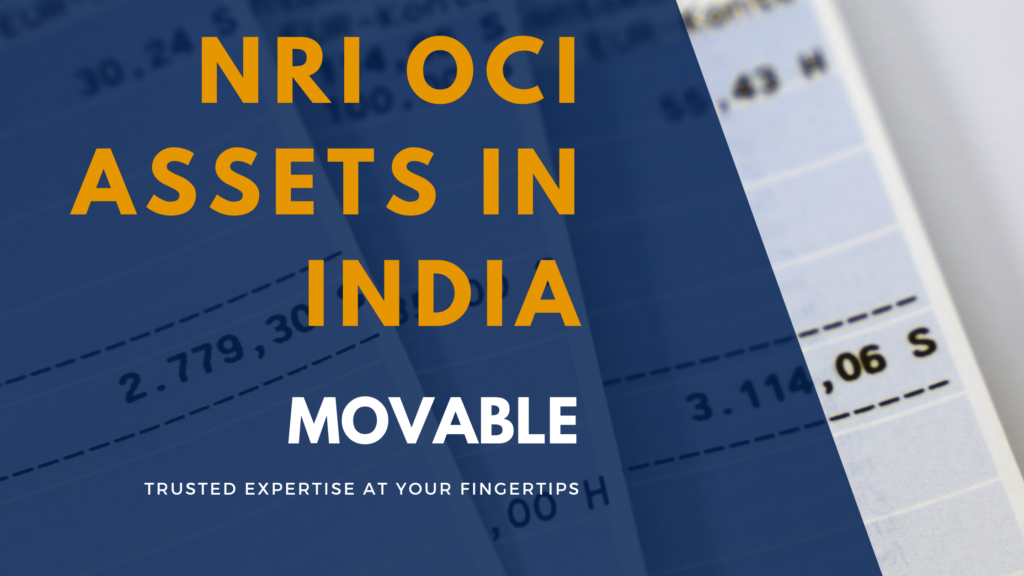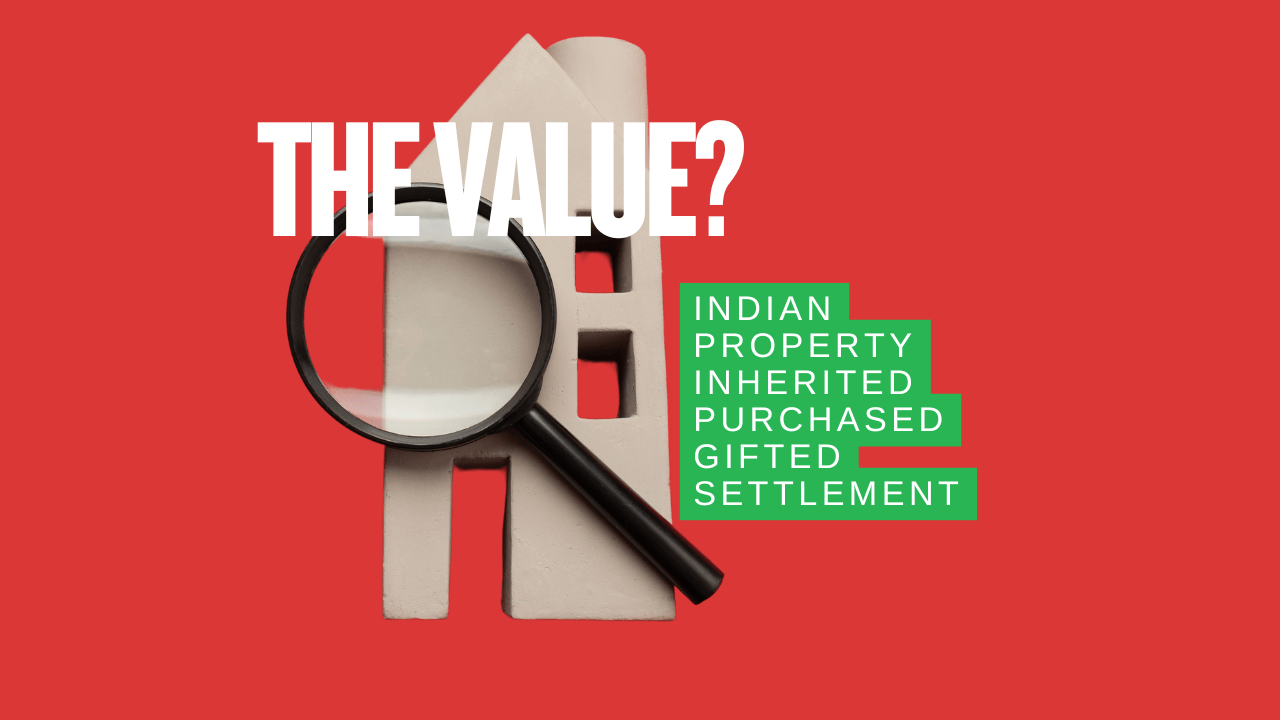Continuing from our previous segment for NRI OCI assets in India, we touch on movable and immovable assets in India. Specifically, as detailed by Income Tax Department Government of India, Acts (WT).
Firstly, are there any rules for determining the value – NRI OCI real estate in India? Yes there are. The Government of India (ITD) has set specific rules to determine the value of assets in India. These rules are guidelines used for determining the value of an individual’s assets as and when the need arises. The rules have categories and definitions that apply to different assets.
They may not all apply to you.
Where you wish to do so, a valuation office/representative can be used to obtain a valuation of your property in India. There are some things to consider before you decide to begin any process.
A big question would be what value do your asset(s) in India hold for you, both in terms of ROI tangible as well as intangible.
Not everyone’s reason to pursue their movable, immovable assets in India are the same. It is imperative to consider the wider outlook yourself and then seek an initial consultation before you begin. Of course this is just one way to proceed. But if you start on the right foot, eventually it may save you a considerable amount of time and investment in the long run. Gains may be substantial in the mid-long term.
The Right Approach
NRI OCI property legalities OR selling your property in India require a considered approach. If you are considering on acting on your assets in India it can be useful to take a detailed initial consultation to help you find the most suited route. It may help provide clarity on a course of possible action whether that may involve selling your property, renting out your property(s), a legal course of action for your property or similar areas.
The issue alot of NRI OCI face is finding services that fit, the scope of which is individual for everyone. Further, a good relationship goes along way and that is a mutual effort between all parties.
It is also useful to know that the application of Indian legal system crosses over into other aspects, such as the legal system culture. Sometimes this can make things a little more complicated. However, a firm or services that are experienced in the same can bring clarity on such matters.
Valuation Of Assets
Alternatively, where you’re considering using the services of a firm for your property in India as an NRI OCI, the firm may also be able to obtain a valuation as a part of the whole service. Some NRI OCI adopt this route, it depends on the circumstances and requirements. Although the Indian legal system is the same for any individual, however, how it applies to your circumstances may differ.
It also depends on how much time you have, whether you can travel to India frequently or not as well as the costs involved in doing so. Where you are unable to travel so frequently due to personal/professional commitments you can still consider providing a Power of Attorney to a trusted individual/firm to act on your behalf.
Types of Assets/Inheritances/Investments
Your assets as an NRI OCI may include, both movable and immovable assets in India.
- Movable Assets, such as; cash, bank accounts, gold, stocks and shares and so on.
- Immovable Assets, such as; houses, commercial buildings and so on.
Below we look at some terminology from the “rules for determining the value of assets” as outlined by the ITD, Government of India, specifically in relation to immovable assets, such as land/built up property and the like. It helps to become aware of your options as an NRI OCI, Foreign Citizen with Indian assets.

NRI OCI Immovable Assets – Land/Building/Property
Subsequently, we look at specific terms/definitions related to immovable asset such as land/building/property as per the Government of India. (As per rule 6 of schedule III, [Section 7(1)] of Income Tax/Acts/Wealth Tax – definitions).
Aggregate Area
“aggregate area”, in relation to the plot of land on which the property is constructed, means the aggregate of the area on which the property is constructed and the unbuilt area;
Specified Area
“specified area”, in relation to the plot of land on which the property is constructed, means–
(i) where the property is situate at Bombay, Calcutta, Delhi or Madras, sixty per cent of the aggregate area;
(ii) where the property is situate at Agra, Ahmedabad, Allahabad, Amritsar, Bangalore, Bhopal, Cochin, Hyderabad, Indore, Jabalpur, Jamshedpur, Kanpur, Lucknow, Ludhiana, Madurai, Nagpur, Patna, Pune, Salem, Sholapur, Srinagar, Surat, Tiruchirapalli, Trivandrum, Vadodara (Baroda) or Varanasi (Benaras), sixty-five per cent of the aggregate area; and
(iii) where the property is situate at any other place, seventy per cent of the aggregate area :
(c) “unbuilt area”, in relation to the aggregate area of the plot of land on which the property is constructed, means that part of such aggregate area on which no building has been erected.
The term “aggregate area” refers to the total area of the plot. Whereas the “specified area” details the constructed area which also includes any area unbuilt. Why is this important? A valuation for immovable assets such as a plot of land with a constructed building would require the valuation representative to calculate with breakdown the terms detailed here (as per the ITD Rules, Government of India).
Below we will briefly look at an example of immovable asset(s) as per the “rules to determine the value of assets in India.”
NRI OCI Movable Assets – An Example
Simultaneously, we consider Gold and Jewellery in the case of immovable property in India.
Under the rules for determining the value of assets – ITD, Government of India,
“gold” means gold, including its alloy, whether virgin, melted, remelted, wrought or unwrought, in any shape or form of a purity of not less than nine carats and includes any gold coin (whether legal tender or not), any gold ornament and other article of gold;
“gold ornament” means any article in a finished form, meant for personal adornment or for the adornment of any idol, deity or any other object of religious worship made of, or manufactured from, gold, whether or not set with stones or gems, real or artificial, or with pearls, real, cultured or imitation, or with all or any of them and includes parts, pendants or broken pieces of gold ornaments;
“jewellery” includes—
- (a) ornaments made of gold, silver, platinum or any other precious metal or any alloy containing one or more of such precious metals, whether or not containing any precious or semi-precious stones, and whether or not worked or sewn into any wearing apparel ;
- (b) precious or semi-precious stones, whether or not set in any furniture, utensils or other article or worked or sewn into any apparel
Further, under the ITD rules (Acts), “the value of the jewellery shall be estimated to be the price which it would fetch if sold in the open market on the valuation date (hereafter in this rule referred to as fair market value).”

(NRO) Non Resident Indian Ordinary Account – Property Sale
Why would one need an NRO account in relation to NRI OCI property?
The simple answer is to deposit sale proceeds of your sold property. Subsequently in order to obtain an NRO account you would also require a NRI PAN, OCI PAN.
Our next segment will detail more on the NRO account and its benefits.
Frequently Asked Questions
PAN card is required.
Yes that is correct.
It can be obtained by following due process with a firm/representative that can provide valuation. You may also need an NOC it depends on the circumstances of the property.
Related Links
- Transfer of property in India
- Indian Property disputes
- Sell property in India
- Power of Attorney Service
- NRI OCI PAN Card
We can also assist with the following NRI Services in London:
- Illegal occupation of property in India
- Family Settlements and partition of NRI Indian property
- Ancestral real estate and inheritance advisory under Indian law
- NRI Property Transfer
- Possession of NRI Property
- Recovery of NRI money under Indian Law
- NRI Succession Certificate in India
- Injunction against alienation of NRI property in India
- Developer Claims under the Consumer Protection Act in India
- NRI property disputes
- Visas to India
- Indian Power of Attorney
- NRI PAN Card
- Overseas Citizenship of India (OCI)
- Inter-Country Adoption
- Divorce proceedings under Indian Law for parties settled abroad






